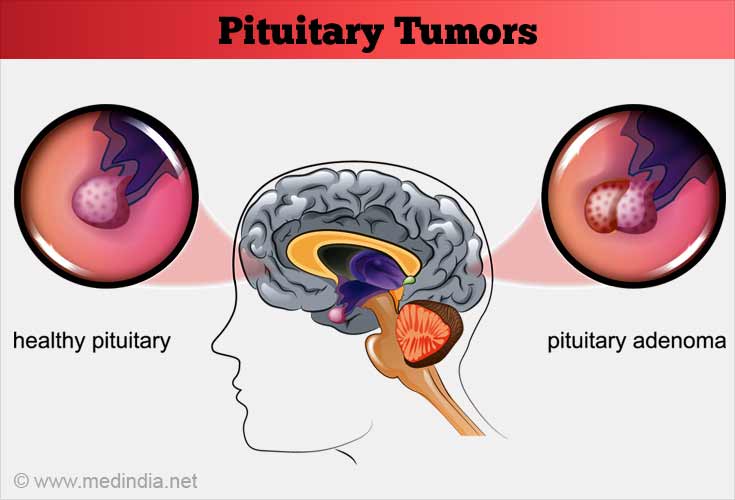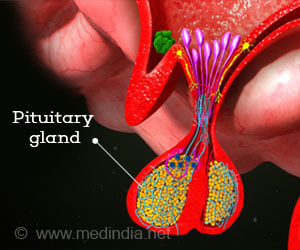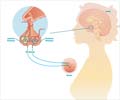- Pituitary tumor - (http://www.nlm.nih.gov/medlineplus/ency/article/000704.htm)
- Medication (Drug Therapy) for Pituitary Tumors - (http://www.hopkinsmedicine.org/neurology_neurosurgery/centers_clinics/pituitary_center/pituitary-tumor/treatment/drug-therapy.html)
What is a Pituitary Tumor?
A tumor is an abnormal tissue mass that forms because of the abnormal division and growth of cells. This can occur in any part of the body and when such a formation occurs in the pituitary gland it is referred to as a pituitary tumor. The pituitary gland is a small gland that is located just behind the nose in the center of the brain. This gland plays an important function because it is responsible for the production of various hormones that regulate a number of bodily functions, which is why it is commonly referred to as the master endocrine gland. It even regulates the production of hormones by other hormonal glands in the body.
Pituitary tumors are almost always non-cancerous or benign and are also called pituitary adenomas. Unlike cancerous tumors, or pituitary carcinomas in the case of cancerous pituitary tumors, these tumors do not spread to other areas. Although they may not pose the same amount of threat as a pituitary carcinoma, pituitary adenomas can also be extremely threatening because of the risk of various health complications. The risk of complications is high because of the location of the tumors in such proximity to the brain. These tumors do not spread outside the skull, but tend to remain confined within the sella turcica, which is a small enclosure within the skull that houses the pituitary gland.

These benign tumors can grow into the walls of the sella turcica and may also spread in the surrounding, nerves, coverings of the brain and blood vessels. Because of the small space within this particular region, the tumors can cause compression of parts of the brain and nerves even though they don’t grow very huge. As a result, patients may experience symptoms like headaches and changes in vision. The other effect of such tumors is that they cause an imbalance in hormones because of their effect on the functioning of the pituitary gland itself.
What Causes Pituitary Tumors?
The causes of pituitary tumors are not really understood, but there are certain factors that may increase your risk of pituitary tumors. This doesn’t mean that you will get cancer or suffer from a pituitary tumor but simply means that you are at a higher risk. Similarly, someone without any known risk factors could also get a tumor or cancer. Some of the risk factors of pituitary tumors include the following hereditary diseases:
- Multiple endocrine neoplasia type 1 (MEN1) syndrome, which is a disorder that involves the formation of tumors in the endocrine glands and part of the small intestine.
- Carney complex, which is a condition in which several types of tumors can form, including those in the pituitary gland.
What are the Symptoms of Pituitary Tumors?
Pituitary tumors can cause a wide variety of symptoms depending on the functions that are affected or depending on the particular hormone, whose production is affected. In some cases, the tumor may not even cause any noticeable symptoms.
Symptoms of a pituitary tumor when hormone production in some part of the gland is stopped or significantly reduced could include:
- Headaches and partial vision loss

- Loss of body hair and even facial hair in men
- Men can also experience impotence and the growth of breast tissue
- Sudden disappearance or reduction in frequency of menstrual periods and a halt to milk production in women
- Lowered sex drive in both men and women
- Slowing down of growth and sexual development in children
When a pituitary tumor has the opposite effect, stimulating excessive production of certain hormones, the symptoms can vary considerably depending on the specific hormone that is being produced in excess. Symptoms of a pituitary tumor caused by excessive production of these hormones could include:
Prolactin:
- Headaches and partial vision loss
- Men may experience impotence, while women may experience difficulty getting pregnant if possible at all
- Menstrual periods may disappear, become less frequent or have reduced flow
- Lactation may begin in women who are not pregnant or breast-feeding
- Reduced sex drive

Adrenocorticotropic Hormone (ACTH) :
- Headaches and partial vision loss
- Weight gain on the torso, face and neck, while the limbs remain unaffected.
- Fat deposits on the back of the neck
- Bruising may occur easily and thin skin with stretch marks may also be observed on the chest and tummy
- Weakening of the skeletal structure with bones fracturing or breaking more easily
- The appearance of fine hair on facial region and also on the arms and upper back
- Patients may also suffer from depression, anxiety and irritability for no reason
Growth Hormone:
- Headaches and partial vision loss
- Acromegaly can affect adults and is a condition of abnormal bone growth in the face, hands and feet
- In children there may be abnormal growth with the child growing taller and larger than is normal
- Excessive sweating

- Pain in the joints
- Tingling sensation or numbness in the hands and fingers
- Sleep apnea or snoring and interrupted breathing during sleep
- Dysmorphophobia is also not uncommon, with patients having an unusually strong dislike or concern about the appearance of some body part
Thyroid Stimulating Hormone:
- Sleep problems
- Irregular heartbeat
- Excessive sweating
- Inexplicable weight loss
- Increased frequency of bowel movements
Pituitary tumors may also cause certain other symptoms like nausea and vomiting, dizziness or confusion and seizures. Some patients may also experience a ‘runny’ nose, except that it isn’t nasal fluid, but is cerebrospinal fluid surrounding the brain that has leaked into the nasal cavities.
How to Diagnose Pituitary Tumors?
Diagnosis can be tough because of the sheer number of symptoms and the wide variety of possible causes. If a pituitary tumor is suspected however, certain tests can help make a diagnosis. These include:
- Blood and urine tests to detect any abnormalities in hormone levels
- CT Scans or MRI scans to identify the presence of the tumor and also determine its precise location and size
- Visual tests to check if there is any impairment to vision because of the presence of a tumor

Additionally, doctors may also refer you to an endocrinologist for more specific tests to check endocrine function. Some of these endocrine function tests could include tests to check cortisol levels, follicle stimulating hormone levels, testosterone levels and thyroid hormone levels among others. The findings of these tests can be especially useful in helping doctors formulate an appropriate treatment plan.
What are the Treatments for Pituitary Tumors?
Treatment for pituitary tumors will ultimately depend on the type of tumor and how it affects the patient. The size of the tumor and the person’s age, as well as the presence of other health conditions are also taken into account. Treatment typically involves three approaches:
Surgical – Non-invasive methods are obviously preferred, with the tumor usually being removed with an endoscope or microscope, via the nasal cavity and sinuses. Surgery is the most commonly used and most effective method of treatment for all pituitary tumors with the exception of prolactinomas. In rare cases, the tumor may need to be removed from the front of the skull in a procedure called a craniotomy.

Radiation – Radiation therapy is used for the targeted destruction of tumor cells. There have been significant improvements in radiotherapy and the increased accuracy levels greatly reduce any risks. Radiotherapy is often used in combination with surgery and medication and is called radiosurgery. This combined treatment is often necessary to prevent or control the growth of tumors.
Medication – The administration of medications to shrink the tumor and prevent it from producing hormones is usually the first line of treatment for prolactinoma. For many patients, post-operative hormone replacement therapy may also be necessary.









